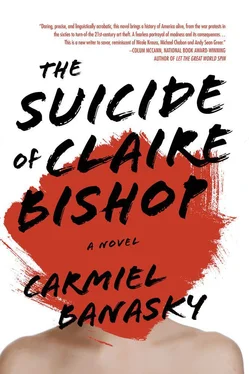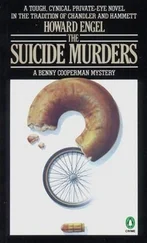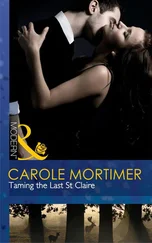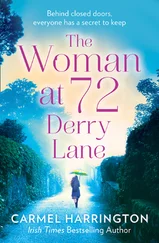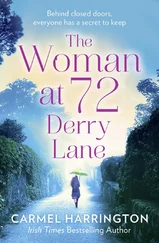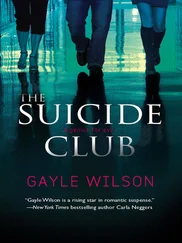She stayed with him for three days. He fed her well, as if he knew — a stray, a temporary home. Then he flew to Europe on business and the next time they saw each other nearly a year had passed, too much time, and they smiled across the room and that was all. A silent pact to erase a week. To disengage a memory, to unknow it.
The painting was under the bed. Most nights she would peek at it before going to sleep, a new ritual. It lay on its back, facing her back, and she could swear she felt it like a body, with arms and other parts breathing underneath her.
A week or so into their stay, Claire was walking past the bathroom door when Jill flung it open, startling her. She was terribly afraid he’d think she was spying on him, hovering there in the hall.
“Can I run something past you?” he asked, as if they were in school together, not the door to the toilet.
Claire cleared her throat. “Yes, of course.”
Jill glanced quickly up and down the hall, then grabbed her arm. “Come in here.” Before she could object, Jill pulled her inside and closed the door.
“Read this.” He shoved a copy of The Sad Gay Life into her hand, a paperback novel he must have taken from her bookshelf. His face was inches from hers. She could smell something like clove in his hair. She glanced from the cover, to him, back again. “No,” he said. “Not the book. This.” He flipped to a blank page in the front, now veiled in penciled script. She squinted at it, but could hardly begin to mobilize that portion of her brain. “I know, my handwriting. But I’ve been hammering out this idea,” he said.
“I don’t think I’m the right—” Claire tried.
“It’s like this. So what if I’m not an artist? I know art. At least, I know what I like. And you know how I feel about the war. And these rallies. We can really do something here.” He stopped talking and waited as if he’d asked her a question.
“Yes, I agree. But I don’t understand what…”
“Right. Sorry. I forget sometimes that you can’t read my mind. Feels like you could.” He smiled sheepishly at her. Claire hung her head over the book, shielding her red cheeks with her hair. “It’s like this,” he went on. “I think the real success of this movement has to come from art. That’s how we’re going to reach people. But not cheesy, obvious art like you see at marches. It has to be bigger than that. Like the Surrealists in France. A whole political movement that started with art. We’ve got nothing like that here. Just a bunch of freaks on the street. That’s how they see us, even the middle-class pacifists. They won’t join. They’re too scared. They think it’s just some drugged-out youth movement. It’s not. It’s a people movement.” Jill let out a breath, like he’d been holding onto those words for ages.
“So art could bridge that gap,” Claire said. “But I still don’t see how I would be much use. Have you talked to Carlos?”
Jill’s face sunk. Claire wanted desperately to say something smart and useful and unique. Something to meet the expectations that she didn’t know he had of her until now. He looked proud, and spent. She had to say something.
“I might know someone,” Claire said before she could stop herself. “An artist. She used to live in the neighborhood. Very influential. I heard she was a Freedom Rider.” Jill perked up a little. “But I don’t know that we’ll unearth her. It was a long time ago.”
Now when Claire sat with the painting each night, she dared herself not to think of Nicolette. Running her hand along the canvas, perhaps ruining the painting with the oils of her fingers, but she didn’t care. She laughed at her own strangeness. But she felt comforted by the painting, its new proximity. Like an old lover she didn’t know she missed until they were near once again.
Of course, as soon as she tried not to think of Nicolette, there was no stopping it. Claire often wondered where she was, what adventure. She seemed only to imagine Nicolette in exotic landscapes — beaches, old fortresses — never close by. Perhaps this kept Claire from looking her up, imagining she was unlocatable.
But as soon as Claire became aware of her own daydream, she would cover it with the drop cloth of a more immediate worry: whether she’d be able to pay the electric bill this month.
Bird was on the phone in the kitchen and his back was rocking. Claire paused in the doorway.
“I’m fine. Yes, I’m eating. Is Dad going to get the operation?” he said forcefully, as if he might lift off the ground had he spoke with less weight. There was a pause and then, “If you don’t tell me I’ll kill you.”
Claire had never heard Bird speak like this. He was always the playful follower. Being the youngest seemed to make him feel special.
“I won’t kill you,” he said, softer now. “I’m just mad. I want to know. Call me if Mom says anything. Promise…cross your heart…I don’t hear you crossing your heart.” A leaden sigh. “Yeah, yeah, I love you, too.” Bird set down the receiver, breathing shallowly.
So they had worlds outside of this apartment, this movement. They had problems and people and anger and other injustices to contend with.
Claire stood where she was, couldn’t make herself move toward him. She could so easily lie and say, “Little Bird, it will be all right. Nothing is so bad in the end.” But there seemed to be an invisible shield around the room. She couldn’t go forward. She couldn’t be good. Her bag slipped from her shoulder with a thud.
As Bird turned toward the noise, Claire slipped down the hall to her bedroom, away from him. She heard him call after her, “Who’s there? Carlos? Don’t be a jerk.”
Why couldn’t she be good?
Taking a cue from Jill, Claire found respite in the quiet of her bathroom. She needed to better herself, she felt desperate in that. Perhaps if she looked happier. In the mirror, she made a face like Julie Andrews dancing in the Alps, that doltish, open-toothed smile, those dewy eyes. But it wasn’t her face. Claire put on her rarely worn eyeglasses and studied herself. She’d always been told her eyes were beautiful, cat-like, until she was forced to hide them behind frames. When she noticed the lack of compliments, she’d stopped wearing them, only to get lost in her own neighborhood.
Still, something had shifted since Freddie. Around these boys, she could see the change more clearly. She smiled more freely, laughed at their impressions of LBJ, and of Claire, too — Bird got her pout right, and the way she said, “Be careful, use a coaster,” though she’d given up on that after their third day.
But it wasn’t enough. She was no good to anyone.
Claire went back into the kitchen and found Bird still sitting there, deeply concentrating on his Coca-Cola. “My father isn’t doing so well these days either,” she said from the door.
Bird turned to her and she sat down beside him. He played with the condensation on the bottle. “Does he need to have an operation, too?”
“No,” Claire said. “I don’t know what that’s like.”
Bird only nodded. Then he slid over his sticky, half-finished soda. An offering.
Whenever Claire walked home from the library in the fresh air with a touch of spring, only to enter the muggy dungeon of stench the boys had built up around themselves, this thought entered her mind: where were the women?
When she asked why they never invited girls around to help out, and that she couldn’t imagine none of them had girlfriends, Bird replied that girls were gossips and might spoil their covert missions. Lawrence flicked Bird’s ear and said that what Bird meant was they wouldn’t take risks if they cared about girls. “What if they got hurt because of us? Better to have just men,” he said. And Claire asked, “What does that make me?” Jill shrugged and said that if she wanted more women around, she should find that artist she’d mentioned.
Читать дальше
